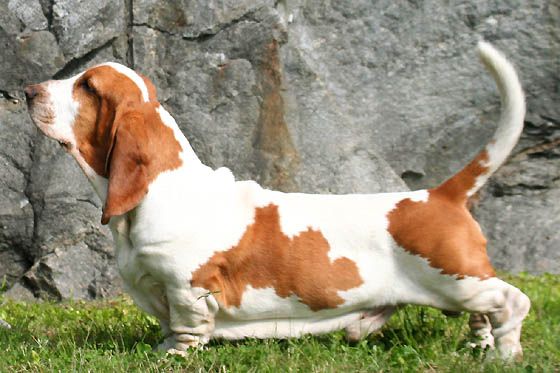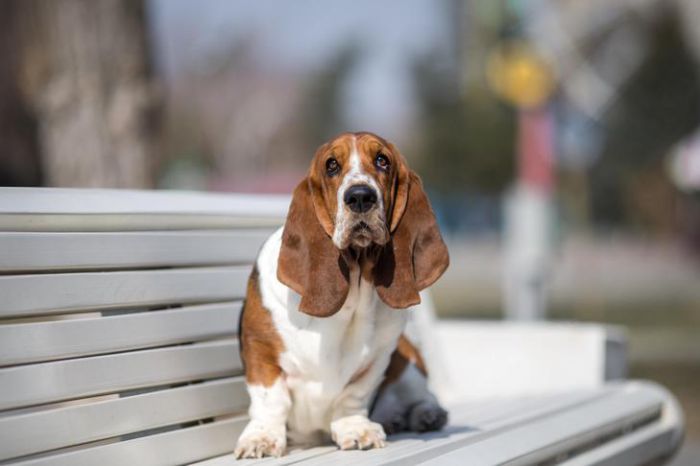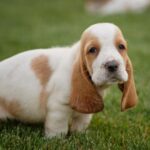If you’re wondering how big do Basset Hounds get. Find out the answer in the article below with Alibay Store.
Introduction to Basset Hounds
Basset Hounds are beloved for their adorable, droopy-eyed appearance and loyal, friendly personality. Known as a medium-sized breed, they often surprise people with their weight and sturdy build, especially given their low height and short legs. These unique proportions are a big part of what makes the breed distinct and charming.
How Big Do Basset Hounds Get?
According to the American Kennel Club (AKC), adult Basset Hounds typically weigh between 40 and 65 pounds and stand about 12 to 15 inches tall at the shoulder. This height makes them one of the shorter dog breeds, but their muscular bodies and deep chests give them a substantial, solid feel. Let’s break down their size in more detail.
Growth Phases and Average Size of Basset Hounds
Like many dog breeds, Basset Hounds undergo different growth stages from puppyhood to adulthood. Here’s a closer look at each stage:
Puppyhood (0-6 months)
Basset Hound puppies grow rapidly during their first few months of life. During this time, their legs remain relatively short while their bodies begin to develop muscle mass. By the age of six months, most Basset Hounds reach around 20-30 pounds.
Adolescent Phase (6-12 months)
As they approach their first year, Basset Hounds gain more weight and height, although the height growth starts to slow down. The weight during this phase can vary, with some reaching 30-45 pounds as they continue to grow into their bodies.
Full Adulthood (1-2 years)
Basset Hounds are considered fully grown by the age of 2, by which time they generally weigh between 40-65 pounds. The 12-15 inch height measurement remains consistent, giving the breed its characteristically low and sturdy frame.
How big do Basset Hounds get? Factors Affecting a Basset Hound’s Size
Various factors can influence the final size and weight of a Basset Hound, even though the breed’s standards remain largely consistent. Here are some key influences:
- Genetics: Genetics play a significant role in determining a Basset Hound’s size. Some may naturally grow to the higher end of the weight spectrum due to their lineage.
- Diet: A balanced diet is crucial for healthy growth. Overfeeding or underfeeding can impact a Basset Hound’s development, potentially leading to obesity or stunted growth.
- Exercise: While Basset Hounds don’t require intense exercise, regular walks and play help them develop strong muscles and a healthy weight.

Why Basset Hounds Are Unique
Basset Hounds were initially bred for hunting small game, especially rabbits, so their short legs and strong bodies are designed for stamina rather than speed. Their lower center of gravity allows them to follow scent trails effectively, even through dense brush, making them excellent hunting companions. This purpose-bred physique contributes to their distinct proportions and explains why they are both stocky and low to the ground.
Caring for a Basset Hound’s Weight
Maintaining a healthy weight is essential for Basset Hounds due to their unique build. Here are some tips to ensure your Basset Hound remains fit:
- Balanced Diet: Opt for high-quality dog food with the right balance of protein, fats, and carbohydrates. It’s advisable to avoid overfeeding, as Basset Hounds are prone to obesity.
- Regular Exercise: Daily walks and short play sessions are great for keeping they in shape. Although they are low-energy dogs, regular activity prevents excess weight gain and promotes muscle strength.
- Veterinary Check-Ups: Routine vet visits help monitor their growth and catch any health issues early, especially those related to weight gain.
Common Health Concerns Related to Size
Due to their size and structure, Basset Hounds can be prone to specific health issues. Some common concerns include:
- Obesity: With their short legs and long backs, extra weight can strain their spine and joints. Obesity is a major concern, so monitoring their diet and exercise is essential.
- Joint Issues: Like many medium-sized dogs, Basset Hounds can experience hip dysplasia and elbow problems. Keeping their weight in a healthy range reduces the risk of these joint issues.
- Spinal Health: Their long backs are susceptible to injuries, especially if they jump or fall from heights. Avoid allowing they to jump onto or off high surfaces.

Basset Hounds, with their unique structure and charming personalities, are a delightful breed that typically weighs between 40 and 65 pounds. Ensuring they maintain a healthy weight is vital for their overall well-being. By providing a balanced diet and regular exercise, you can help your Basset Hound thrive.
Don’t forget to check out the Basset Hound Dog Bowls at Alibay Store—perfect for your lovable companion!






